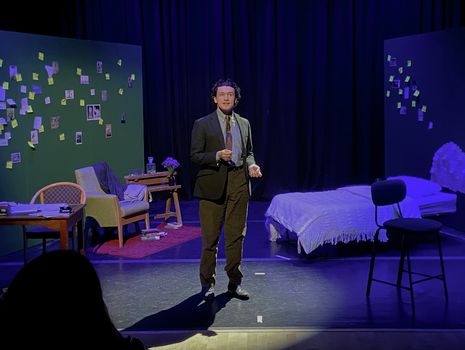Foresight: a review in hindsight
For a play obsessed with sight, did Foresight leave its audience in the dark?

“Write something.” A devastating command straight from the lips of Foresight’s lead, Giovanni Pontiero (Gabriel Jones), which has taunted me for the last two hours. At the time, the command came wrapped in Jones’ effortless vibrato which reverberated around the Fitzpatrick Theatre, worming its way into the minds of audience members. On stage, writing and translation seemed to come with instinctive ease to Giovanni, a character based on the very real “ablest translator of the 20th-century.” And yet, here I sit, one more blank Google doc away from throwing in the towel. Admittedly, I am neither an able translator nor a professional writer, but Foresight seems to have left me tongue tied, though I am not sure in a wholly positive way.
The production charts the career and life of Giovanni, whom upon his AIDS diagnosis in 1996, proceeds with a treatment that progressively blinds him. Enraptured to an almost obsessive degree by the latest work of the critically acclaimed José Saramago (Harry Gant), Giovanni forgoes his treatment for translation. Giovanni’s deteriorating relationships accompany his deteriorating health, as the debate between whether it is better to die as an artist than to live without art becomes ever clearer.
"Foresight seems to have left me tongue tied."
Musically, this student-written production is second to none. With original scores accompanied by a live pit band Writer/Directors Max Mason and Ben Cole have created a euphonic experience. Duets between Giovanni and his partner John (Luke Muschialli) continued between acts, with “Tear the Page” transformed from a song of sweet romance into a tumultuous masterclass showcasing the deep wounds which remain even between those we love. Ensemble members, Hannah Millar and Nicholle Lui Montevalde, must be commended as chorus moments were made incredibly memorable by their expertise in supporting vocals.
For a production obsessed with sight, Foresight was unfortunately no visual marvel. Acting stumbled into stereotype as rushed dialogue and stagnant physical movement refused to allow the actors’ words time to sit in the air. Characters became somewhat “surface-level” in such instances, as conversations seemed to be a means to an end, a moment to catch one’s breath before the next musical number. Combined with a claustrophobic set, which caused more than one cast member to stumble, I couldn’t help but feel that the production was trapped within a musical cage of their own making; sacrificing the sight of fully-grown characters in full-fledged spaces for sonorous superiority.
"Musically, this student-written production is second to none."
And yet, a small part of me questions whether this was not the point of a play showcasing blindness. Was this reduction of spectatorial visual comprehension for the powerhouse vocals of an astoundingly gifted cast merely an enhancement of a blindness which enables one to “see the unseeable?” Instinctively, I felt that this was perhaps an unintended consequence of problematic performances, but it was an unintentional instance which remained endearing nonetheless to the very end. As was highlighted in what could either have been an incredibly poignant moment of paradoxical reflection or a mere scriptural mishap in Jose’s final remarks on Giovanni’s life, where he commented that G “decided to preserve his vision…to preserve his blindness rather.”
The educational self-positioning of the production was not lost on audience members, who hopefully prompted by the start of LGBTQ+ history month a mere two days earlier, saw the production’s biographical aspect as fundamental. Scenes in which the cramped scholars’ den was transformed into a cinematic projection of ACT UP and AIDS coalition protests were standout. Rather than simply encouraging moments of quiet reflection, this deliberately prompted open discussions of a disease so stigmatised by fear and rampant homophobia that it became the enemy, the "terror cell." Giovanni’s muted remark, “I am my illness”, echoed with the degree of finality which so many were forced into. It must be said though that my eyebrows were raised more than once at the lack of LBQT representation or reference in connection to the HIV/AIDS epidemic. Production choices, with the meta-cinematic scenes suspending the biographical plot lines could have easily allowed for such inclusion.
"Was this reduction of spectatorial visual comprehension for the powerhouse vocals of an astoundingly gifted cast merely an enhancement of a blindness which enables one to “see the unseeable?”
As I left the theatre, blinking away the final somewhat dragging scenes of the production, I spotted a singular Terrence Higgins donation box. It served as a reminder that despite achievements and shortcomings of historical conversations about HIV/AIDS, discussions and talking points are vital weapons against the walls of silence and ignorance which surround and harm those living with this all too real disease.
With an undoubtedly clever composition this soundscape leaves nothing to be desired but a deeper visual portrayal of these novel non-fiction characters.
Foresight is showing at the Fitzpatrick Theatre until Sunday 4th February.
 News / Judge Business School advisor resigns over Epstein and Andrew links18 February 2026
News / Judge Business School advisor resigns over Epstein and Andrew links18 February 2026 News / Gov grants £36m to Cambridge supercomputer17 February 2026
News / Gov grants £36m to Cambridge supercomputer17 February 2026 News / Hundreds of Cambridge academics demand vote on fate of vet course20 February 2026
News / Hundreds of Cambridge academics demand vote on fate of vet course20 February 2026 News / CUCA members attend Reform rally in London20 February 2026
News / CUCA members attend Reform rally in London20 February 2026 News / Union speakers condemn ‘hateful’ Katie Hopkins speech14 February 2026
News / Union speakers condemn ‘hateful’ Katie Hopkins speech14 February 2026









